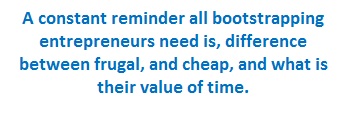The art of bootstrapping a company
By Marwan Emile Faddoul, Managing Partner, NFG Consulting LLC & Guillaume Michael Lange, Marketing Analyst, NFG Consulting LLC
 Networking forms a necessary part of the consulting world, and thus it allows NFG Consulting to have an array of connections, from government to entrepreneurs and investors. This has led to many startups requesting us to liaise them with Venture Capitalists, or Angel Funders, which we usually decline for one simple reason. They do not need it to succeed - let us take Steven for example.
Networking forms a necessary part of the consulting world, and thus it allows NFG Consulting to have an array of connections, from government to entrepreneurs and investors. This has led to many startups requesting us to liaise them with Venture Capitalists, or Angel Funders, which we usually decline for one simple reason. They do not need it to succeed - let us take Steven for example.
 Steven is a close friend of NFG Consulting, and he approached us (NFG) a few months ago, asking NFG to put him in contact with investors for his start-up. Steven insisted on the need for rapid funds to get his project off the ground, but we introduced a different concept to him - Bootstrapping.
Steven is a close friend of NFG Consulting, and he approached us (NFG) a few months ago, asking NFG to put him in contact with investors for his start-up. Steven insisted on the need for rapid funds to get his project off the ground, but we introduced a different concept to him - Bootstrapping.
When it comes to creating a company, many often believe that they lack the resources required, but in reality it is seldom true. Not having an investor should not hinder anyone from starting a business; there simply is a need to manage and plan with a distinct mindset. Bootstrapping is a situation where entrepreneurs start their company with little to no capital resources. The saying comes from one having to pull up oneâs own bootstraps to get out of the mud.
More and more companies should aim to have this set up and follow in the footsteps of over 60% of Inc. 5000 companies. This percentage has increased dramatically in the last few years due to the services, which are available to facilitate startups and business growth at a more affordable price than in the past.
 Before bootstrapping a business, there are a few requirements that should be taken into consideration. This business plan is better implemented with companies who require a low level of upfront investment; factories and hospitals would not entirely fit into this strategy. The advantage of having recurring sales, a short sales cycle and short payment terms facilitate the survival and cash flow of this business scheme. For this to succeed efficiently, the product should be able to optimize the use of social media and word of mouth as main marketing channels.
Before bootstrapping a business, there are a few requirements that should be taken into consideration. This business plan is better implemented with companies who require a low level of upfront investment; factories and hospitals would not entirely fit into this strategy. The advantage of having recurring sales, a short sales cycle and short payment terms facilitate the survival and cash flow of this business scheme. For this to succeed efficiently, the product should be able to optimize the use of social media and word of mouth as main marketing channels.
The easiest market to obtain with this business design is going to be one which already knows of or can easily understand how they need the products. They should not require a great deal of persuasion once they have understood their need. Moreover, even with current demand, your product should follow the different market trends. Understanding where a certain market is going and establishing a reputation there before the competition comes in is fundamental to success.
Many start-ups focus on getting large distribution deals with national retailers and believe this to be the most efficient way to grow. After research and analysis, it was suggested, by Lange, to avoid major distribution deals but rather embrace the opportunity to directly sell to end-consumers for a multitude of reasons. The large retailer market looks to feed current demand and never to create a need for a new product. An enormous amount of effort is needed to sign an advantageous distribution deal and this time can be better invested in strategic planning and culture development within any new company. Signing a distribution deal can also complicate production scaling; the capacity of production will need time and resources to fulfill the new demand successfully.
 However, by using direct selling, entrepreneurs will be exposed to consumers and this has many essential advantages. Profit margins will be higher by eliminating the middle reseller, which in the long run will allow for more important valuation of the company. Moreover, the growth can be stabilized and controlled at an efficient pace, but more importantly, one can organize an easy channel of communication with clients, thus allowing for timely feedback. If used efficiently, this feedback can allow the owner of the company to improve and invest in the product to better meet consumer demand, which is essential for long-term survival and overall success. Once the product has been perfected and optimized, then a retail deal can be considered, but not before.
However, by using direct selling, entrepreneurs will be exposed to consumers and this has many essential advantages. Profit margins will be higher by eliminating the middle reseller, which in the long run will allow for more important valuation of the company. Moreover, the growth can be stabilized and controlled at an efficient pace, but more importantly, one can organize an easy channel of communication with clients, thus allowing for timely feedback. If used efficiently, this feedback can allow the owner of the company to improve and invest in the product to better meet consumer demand, which is essential for long-term survival and overall success. Once the product has been perfected and optimized, then a retail deal can be considered, but not before.
When offering this advice to Steven, he mentioned how he could not envision survival with no influx of investment to the stage where he could take advantage of large retailers. The important concept, which Marwan Faddoul explored, was cash flow and differences with income and profits. Cash flow forecasting is the ability to anticipate and predict the inflow and outflow of money from a business where as profits are the bottom line, often on paper. Many companies have found themselves profitable but unable to survive due to cash management. Limiting upfront investments and allowing for careful planning of receivables are requirements for a successful bootstrapping company. An important way to limit initial investment is to lease; conditional sales contract and chattel mortgage contracts allow for improved company cash-flow control.
 Another potential improvement is to the receivable and creditor periods. NFG Consulting advised Steven to negotiate these to his advantage. If he was given more time to pay for materials while being able to shorten the time given to his customers to pay without damaging his sales, it could greatly improve his long-term feasibility. The goal and ideas are clear, but the implementation was a mystery to Steven. The offered suggestion was simple: ask for what you desire. Following a few months of regular business and increasing trust, many suppliers will offer credit. If this is not enough, producing a letter of financial transactions from regular buyers should be used to show consistent income and demand, thus enticing a sense of durability and reliability.
Another potential improvement is to the receivable and creditor periods. NFG Consulting advised Steven to negotiate these to his advantage. If he was given more time to pay for materials while being able to shorten the time given to his customers to pay without damaging his sales, it could greatly improve his long-term feasibility. The goal and ideas are clear, but the implementation was a mystery to Steven. The offered suggestion was simple: ask for what you desire. Following a few months of regular business and increasing trust, many suppliers will offer credit. If this is not enough, producing a letter of financial transactions from regular buyers should be used to show consistent income and demand, thus enticing a sense of durability and reliability.
When these types of negations fail, an improving cash flow is vital and the alternative is to sell receivables. When customers have debts towards a company, firms exist to buy their debt at 75% to 90 % of its full value. This allows entrepreneurs to receive cash instantly while forgoing a portion of their receivables. This however allows the management to concentrate on new sales and strategies instead of investing time chasing creditors.
Steven mentioned he lacked hours per day to get everything done, thus we advised him not to do everything independently. Regarding hiring on a bootstrapping budget, many key points were shared. When choosing whom to hire, it is important to understand expectations of potential staff according to their previous experience. Hiring experienced and seasoned staff can be a very expensive option, which might not be feasible depending on the initial investment level.
Our recommendation leaned towards hiring unproven, ambitious and talented staff for the following reason - they are on the job market to gain experience and payment - perks are not their priorities. They will accept challenges as an opportunity to grow and solve issues. Their inexperience allows them to challenge concepts and status quo; a perfect example of this is George Bernard Dantzig at UC Berkeley. Not knowing that something is impossible will allow young minds to challenge it and find new ways to succeed around it - the creative thinking that all startups need to be innovative and grow.
This ambition and determination allows entrepreneurs to offer options and shares to substitute for cash payment, which can be an incentive for staff to commit more and also this method does not disadvantage cash flow. We warned against hiring redundant staff; the negative impact of firing staff outweighs temporary productivity advantages. Creating a working environment, including furniture and rental space, has an important opportunity cost, especially if they are not being utilized when a staff leaves. Moreover, seeing a coworker leave the office is an unsettling feeling and can strongly disrupt the productivity of the office as well as discredit the leadership ability of the owner. Externally, it can be a PR struggle to keep appearances to creditors and others of the future financial stability of the company while firing staff.
 A constant reminder all bootstrapping entrepreneurs need is to understand the difference between frugal and cheap and what is their value of time. When it comes to expenses, one must focus on functionality and not form. Getting brand new furniture incurs a lot of costs for the functionality they offer, however if a vehicle breaks down and causes serious reputational loss, functionality has not been observed properly. Moreover, spending hours creating individual business cards to save the cost of printing is not optimizing resources. Time has value, and thus every hour spent on a certain project must be able to raise sales or reduce costs at an efficient rate.
A constant reminder all bootstrapping entrepreneurs need is to understand the difference between frugal and cheap and what is their value of time. When it comes to expenses, one must focus on functionality and not form. Getting brand new furniture incurs a lot of costs for the functionality they offer, however if a vehicle breaks down and causes serious reputational loss, functionality has not been observed properly. Moreover, spending hours creating individual business cards to save the cost of printing is not optimizing resources. Time has value, and thus every hour spent on a certain project must be able to raise sales or reduce costs at an efficient rate.
The key long term points we shared with Steven pointed out his ability to retain independence and not have obligations to shareholders or venture capitalists due to having accepted investments. Moreover, his profits were his to keep or reinvest, without having to pay interest or dividends. Because of these two reasons, he could keep the strategy true and objectives clear as he retains control over his company.
Bootstrapping eliminates waste due to the limited availability of financial resources. The question leaders ask themselves in this situation is "is it worth spending?" instead of "how should I spend this investment money?" Having limited resources allows the company to work at a faster pace and to solve problems frugally and efficiently. This develops a work ethic and allows it to cascade to the rest of the staff, establishing a winning company culture. This is a competitive advantage, which can be kept and implemented once substantial growth happens.
Quest Bar only survived because one of its founders took a "saw and a blowtorch" to a machine in which they had invested all their funds into. Re-designing and re-building, using the finite resources they had, allowed them to turn their start up into a 200-staff company with a "Quest Success Spirit". Not focusing on finding investment allowed them to focus on their product and problems, making them financially viable on their own.
An advice to all like Steven is to stay true to your goals, understand that there is no absolute need for investment and with well planned and anticipated actions no amount of capital can limit ideas and innovations.
---END---